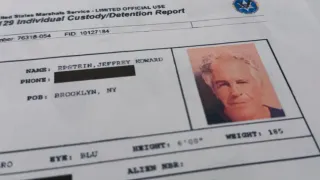March 27, 2018
Judge Rejects Call for Mistrial by Gay Club Shooter's Widow
Tamara Lush and Jason Dearen READ TIME: 3 MIN.
A judge has ruled that the revelation that the Pulse nightclub shooter's father was an FBI informant for 11 years before the attack has little bearing on the trial of the gunman's widow.
U.S. District Judge Paul Byron on Monday rejected a defense motion for a mistrial of Noor Salman, who is accused of helping her husband plan his June 2016 mass shooting at the gay nightclub in Orlando, where he killed 49 people.
Lawyers for Salman said that because prosecutors didn't disclose that Mateen's father, Seddique Mateen, was an FBI informant until halfway through the trial, her Fifth Amendment right to due process and Sixth Amendment right to a fair trial were denied.
The judge disagreed.
"This trial is not about Seddique Mateen. It's about Noor Salman," the judge said.
Salman, now 31 and the mother of a small child, is being tried in federal court in Orlando. Her defense is scheduled to wrap up this week and lawyers will give closing arguments.
In court on Monday, an FBI agent testified that they considered trying to develop Omar Mateen as an informant, like his father, after investigating him in 2013 and finding he didn't have ties to terrorism.
Salman's lawyers say the government's belated disclosure about Mateen's father and his ties to the FBI has prevented them from exploring the possibilities that Seddique Mateen was more directly involved, and that Salman may have been framed to hide the government's mistakes.
The government's "violations in this case have placed Ms. Salman, the jury, and this Court in a dark wood where the search for truth has been thwarted," they wrote, paraphrasing and citing 15th Century Italian poet Dante Alighieri's The Divine Comedy.
Her lawyers' motion said U.S. Attorney Sara Sweeney sent them an email Saturday revealing some details of the FBI's involvement with Seddique Mateen's activities leading up to the Pulse attack.
"I have just received authorization to disclose the following information about Seddique Mateen," her email said. "Seddique Mateen was a FBI confidential human source at various points in time between January 2005 and June 2016."
This email was sent after jurors heard Shahla Mateen, Omar's mother, deny during cross-examination that her husband had any relationship with the FBI.
The email also revealed other details the prosecution didn't tell jurors, including the discovery in the hours after the shooting that "receipts for money transfers to Turkey and Afghanistan" made in the days and weeks before the shooting were found at Seddique Mateen's home, and that in 2012, an anonymous tipster had accused Seddique Mateen of "seeking to raise $50,000 - $100,000 via a donation drive to contribute towards an attack against the government of Pakistan."
Defense attorneys said had they known about this information in advance of her trial, they would have investigated "whether Mateen's father was involved in or had foreknowledge of the Pulse attack," they wrote.
Prosecutors told the jury that Salman knew Omar Mateen was buying rounds of ammunition for his AR-15, helped him spend thousands of dollars before the attack and knew about his plan when he left their home in the hours before the shooting. They also say she lied in an attempt to mislead FBI agents and had knowledge of her husband's sick fascination with violent jihadist videos and terrorism.
Defense attorneys describe Salman as a simple woman with a low IQ, who was abused by her husband. This latest evidence, they said, points instead to Mateen's father as a potential accomplice.
A man who answered a Florida phone number for Seddique Mateen hung up after asking an AP reporter to identify himself.






